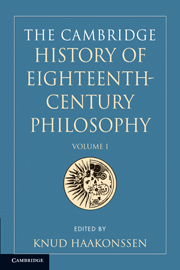Book contents
- Frontmatter
- CONTENTS
- Preface
- Methods of reference and abbreviations
- List of contributors
- I The Concept of Eighteenth-Century Philosophy
- II The Science of Human Nature
- 7 Philosophical Methods
- 8 Human Nature
- 9 Perception and Ideas, Judgement
- 10 Self-Consciousness and Personal Identity
- 11 Reason
- 12 Substances and Modes, Space and Time
- 13 Causality
- 14 Knowledge and Belief
- 15 Scepticism
- 16 Philosophy of Language
- 17 Rhetoric
- 18 Aesthetics
- 19 The Active Powers
- 20 Education
- Biobibliographical Appendix
- Bibliography
- References
16 - Philosophy of Language
from II - The Science of Human Nature
Published online by Cambridge University Press: 28 March 2008
- Frontmatter
- CONTENTS
- Preface
- Methods of reference and abbreviations
- List of contributors
- I The Concept of Eighteenth-Century Philosophy
- II The Science of Human Nature
- 7 Philosophical Methods
- 8 Human Nature
- 9 Perception and Ideas, Judgement
- 10 Self-Consciousness and Personal Identity
- 11 Reason
- 12 Substances and Modes, Space and Time
- 13 Causality
- 14 Knowledge and Belief
- 15 Scepticism
- 16 Philosophy of Language
- 17 Rhetoric
- 18 Aesthetics
- 19 The Active Powers
- 20 Education
- Biobibliographical Appendix
- Bibliography
- References
Summary
INTRODUCTION
The tenor of eighteenth-century philosophy was anti-Cartesian, and the primary vehicle of this reaction was the philosophy of language. In the rationalist view of the seventeenth century, speech served only as the inert outward means for the communication of the prefabricated mental discourse of ideas. In theory as well as in practice, language constituted an epistemological obstacle because it was an easy victim of the seductive inducements of eloquence and persuasion – hence the denunciations of rhetoric that are common in the writings of Galileo, Descartes, and Locke. There were no disputes in geometry because the visual figure delivered its truth without the intervention of communication. But since communication could not be avoided, the new science and philosophy undertook a cognitive appropriation of language, based on the claim that only an emotion-free information language exhibited the true nature of language. Thus language was split in two. One form was considered natural by virtue of being obediently cognitive and descriptive, the other unnatural and in the strict sense allied with the passion and transgression that had caused the Fall. Descartes believed there had been a long-past Golden Age of perfect communication and harmony, a belief that matched the more familiar notion that the origin and nature of language were revealed in Adam’s prelapsarian naming of the animals, an act that characteristically transformed silent epistemic vision into postlapsarian sound.
- Type
- Chapter
- Information
- The Cambridge History of Eighteenth-Century Philosophy , pp. 451 - 495Publisher: Cambridge University PressPrint publication year: 2006
References
- 6
- Cited by



